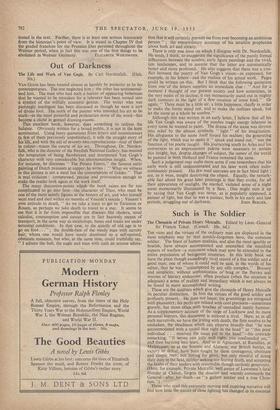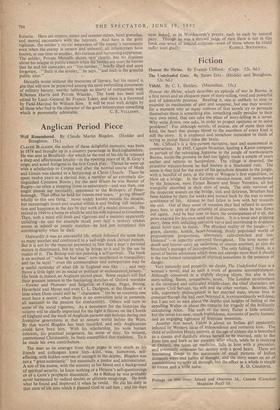Such is The Soldier
The Chronicle of Private Henry Metcalfe. Edited by Lieut.-General Sir Francis Tuker. (Cassell. 10s. 6d.)
THE vices and the virtues of the ordinary man are displayed in the most emphatic way by that quickly-forgotten hero, the common soldier. The finest of human qualities, and also the most ignoble or brutish, have always accompanied and intensified the manifold aspects of warfare—a statement which may now be extended to the entire population of belligerent countries. In this little book we have the plain though exceedingly vivid record of a fine soldier and a good man; one of whom it could well be said, in the words of his editor, that he, was "unhampered by any silly complex." Bravery and simplicity, without sophistication or brag or the flurries and worries of literary endeavour, often produce (when the occasion is adequate) a sense of realism and immediacy which is not always to be found in more accomplished writing.
These are the qualities which give the chronicle of Henry Metcalfe its peculiar distinction. In him the virtues of the good soldier are profusely present. He does not boast; his grumblings are mitigated with pleasantry; his perils are related with cool precision—sometimes gravely, but more often with touches of unstudied manly humour. As a supplementary account of the siege of Lucknow and its more personal horrors, this document is without a rival. Here, as in all such narratives, we have the jesting with death, the firm resolve to be unshaken, the steadiness which can observe blandly that "he was accommodated with a round shot right in the head" or "this poor individual . . . received the usual pill in the head"—his comrade remarking, "It serves you jolly well right, you confounded ass," and then bursting into tears. And' so at Agincourt, at Ramillies, at Malplaquet; so at the Somme and Alamein; our British battles, in victory or defeat, have been fought by these courageous, obstinate and simple men ; not lusting for glory, but only mindful of doing their duty in the field, neither seeking nor fearing death, and accepting the faults of their leaders with reasonable though sardonic generosity. (Here, for example, Private Metcalfe, well aware of Lawrence's fatal blunder at Chinut, forgets the disaster and warmly commends the General—after his death—as "a gallant soldier and a true Chris- tian.") .Those who read this extremely moving and inspiring narrative will find how little the nature of close fighting has changed in its essential
features. Here are snipers, mines and counter-mines, hand grenades, and mortal encounters with the bayonet. And here is the grim vigilance, the soldier's mystid awareness of the enemy's movements even 'when the enemy is unseen and unheard; all infantrymen have known, at one time or another, this curious and harrowing experience. The soldier, Private Metcalfe shows very- clearly, has ho illusions about his relapse in public esteem when the battles are over; he knows that he and his comrades are "live lumber," briefly feted and soon forgotten. "Such is the soldier," he says, "and such is the grateful public also." .
Metcalfe wrote without the resources of literacy, but his record is hrne that will now be preserved among the most enthralling documenti of military history, worthy (although so short) of comparison with Rifleman Harris and Private Wheeler. The book has been well edited by Lieut.-General Sir Francis Tuker, and there is a foreword by Field-Marshal Sir William Slim. It will be read with delight by all those who find in the character of the good infantryman something



















































 Previous page
Previous page